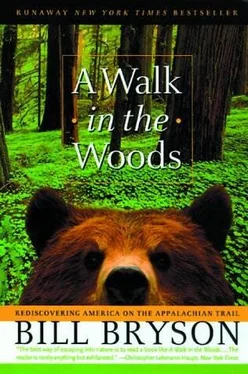Bill Bryson - A Walk In The Woods
Здесь есть возможность читать онлайн «Bill Bryson - A Walk In The Woods» весь текст электронной книги совершенно бесплатно (целиком полную версию без сокращений). В некоторых случаях можно слушать аудио, скачать через торрент в формате fb2 и присутствует краткое содержание. Жанр: Современная проза, на английском языке. Описание произведения, (предисловие) а так же отзывы посетителей доступны на портале библиотеки ЛибКат.
- Название:A Walk In The Woods
- Автор:
- Жанр:
- Год:неизвестен
- ISBN:нет данных
- Рейтинг книги:4 / 5. Голосов: 1
-
Избранное:Добавить в избранное
- Отзывы:
-
Ваша оценка:
- 80
- 1
- 2
- 3
- 4
- 5
A Walk In The Woods: краткое содержание, описание и аннотация
Предлагаем к чтению аннотацию, описание, краткое содержание или предисловие (зависит от того, что написал сам автор книги «A Walk In The Woods»). Если вы не нашли необходимую информацию о книге — напишите в комментариях, мы постараемся отыскать её.
A Walk In The Woods — читать онлайн бесплатно полную книгу (весь текст) целиком
Ниже представлен текст книги, разбитый по страницам. Система сохранения места последней прочитанной страницы, позволяет с удобством читать онлайн бесплатно книгу «A Walk In The Woods», без необходимости каждый раз заново искать на чём Вы остановились. Поставьте закладку, и сможете в любой момент перейти на страницу, на которой закончили чтение.
Интервал:
Закладка:
“I ran. What do you think?”
“And he didn’t catch you?”
“He weighed about 600 pounds. He wasn’t exactly the sprinting type. More the shoot-your-balls-off type. He’s been cruising around for a half hour looking for me. I’ve been running through backyards and crashing into clotheslines and all kinds of shit. I ended up with some other guy chasing me because he thought I was a prowler. What the hell am I supposed to do now, Bryson?”
“OK, first you stop talking to fat ladies in laundromats.”
“Yeah yeah yeah yeah yeah.”
“Then I go out of here, see if the coast is clear, and give you a signal from the window.”
“Yeah? And then?”
“Then you walk very briskly back to the motel, with your hands over your balls, and hope this guy doesn’t spot you.”
He was quiet a moment. “That’s it? That’s your best plan? That’s your very best plan?”
“Have you got a better one?”
“No, but I didn’t go to college for four years.”
“Stephen, I didn’t study how to save your ass in Waynesboro. I majored in political science. If your problem was to do with proportional representation in Switzerland, I might be able to help you.”
He sighed and sat back heavily with his arms crossed, bleakly considering his position and how he’d got himself into this fix. “You don’t let me talk to any women again, of any size, at least until we get out of the Confederacy. These guys have all got guns down here. You promise?”
“Oh, it’s a promise.”
He sat in edgy silence while I finished my dinner, swiveling his head to check out all the windows, expecting to see a fat, angry face pressed against the glass. When I had finished and paid the bill, we went to the door.
“I could be dead in a minute,” he said grimly, then clutched my forearm. “Look, if I get shot, do me a favor. Call my brother and tell him there’s $10,000 buried in a coffee can under his front lawn.”
“You buried $10,000 under your brother’s front lawn?”
“No, of course not, but he’s a little prick and it would serve him right. Let’s go.”
I stepped outside and the street was clear-completely empty of traffic. Waynesboro was at home, in front of the TV. I gave him a nod. His head came out, looked cautiously left and right, and he tore off down the street at a rate that was, all things considered, astounding. It took me two or three minutes to stroll to the motel. I didn’t see anyone. At the motel, I knocked on his door.
Instantly a preposterously deep, authoritative voice said, “Who is it?”
I sighed. “Bubba T. Flubba. I wanna talk to yew, boy.”
“Bryson, don’t fuck around. I can see you through the peephole.”
“Then why are you asking who it is?”
“Practicing.”
I waited a minute. “Are you going to let me in?”
“Can’t. I got a chest of drawers in front of the door.”
“Are you serious?”
“Go to your room and I’ll call you.”
My room was next door, but the phone was already ringing when I got there. Katz wanted every detail of my walk home, and had elaborate plans for his defense involving a heavy ceramic lamp base and, ultimately, escape out the back window. My role was to create a diversion, ideally by setting the man’s truck alight, then running in a contrary direction. Twice more in the night, once just after midnight, he called me to tell me that he had seen a red pickup truck cruising the streets. In the morning, he refused to go out for breakfast, so I went to the supermarket for groceries and brought us both a bag of food from Hardees. He wouldn’t leave the room until the cab was waiting by the motel office with the motor running. It was four miles back to the trail. He looked out the back window the whole way.
The cab dropped us at Rockfish Gap, southern gateway to Shenandoah National Park, our last long stretch of hiking before we ended part one of our big adventure. We had allotted six and a half weeks for this initial foray and now it was nearly over. I was ready for a vacation-we both were, goodness knows-and I longed to see my family, beyond my power to convey. Even so, I was looking forward to what I hoped would be a climactic amble. Shenandoah National Park-101 miles from top to bottom-is famously beautiful, and I was eager to see it at last. We had, after all, walked a long way to get here.
At Rockfish Gap there is a tollbooth manned by rangers where motorists have to pay an entrance fee and thru-hikers have to acquire a backcountry hiking permit. The permit doesn’t cost anything (one of the noblest traditions of the Appalachian Trail is that every inch of it is free) but you have to complete a lengthy form giving your personal details, your itinerary through the park, and where you plan to camp each night, which is a little ridiculous because you haven’t seen the terrain and don’t know what kind of mileage you might achieve. Appended to the form were the usual copious regulations and warnings of severe fines and immediate banishment for doing, well, pretty much anything. I filled out the form the best I could and handed it in at the window to a lady ranger.
“So you’re hiking the trail?” she said brightly, if not terribly astutely, accepted the form without looking at it, banged it severely with rubber stamps, and tore off the part that would serve as our license to walk on land that, in theory, we owned anyway.
“Well, we’re trying,” I said.
“I must get up there myself one of these days. I hear it’s real nice.”
This took me aback. “You’ve never been on the trail?” But you’re a ranger, I wanted to say.
“No, afraid not,” she answered wistfully. “Lived here all my life, but haven’t got to it yet. One day I will.”
Katz, mindful of Beulah’s husband, was practically dragging me towards the safety of the woods, but I was curious.
“How long have you been a ranger?” I called back.
“Twelve years in August,” she said proudly.
“You ought to give it a try sometime. It’s real nice.”
“Might get some of that flab off your butt,” Katz muttered privately, and stepped into the woods. I looked at him with interest and surprise-it wasn’t like Katz to be so uncharitable-and put it down to lack of sleep, profound sexual frustration, and a surfeit of Hardees sausage biscuits.
Shenandoah National Park is a park with problems. More even than the Smokies, it suffers from a chronic shortage (though a cynic might say a chronic misapplication) of funds. Several miles of side trails have been closed, and others are deteriorating. If it weren’t that volunteers from the Potomac Appalachian Trail Club maintain 80 percent of the park’s trails, including the whole of the AT through the park, the situation would be much worse. Mathews Arm Campground, one of the park’s main recreational areas, was closed for lack of funds in 1993 and hasn’t been open since. Several other recreation areas are closed for most of the year. For a time in the 1980s, even the trail shelters (or huts, as they are known here) were shut. I don’t know how they did it-I mean to say, how exactly do you close a wooden structure with a fifteen-foot-wide opening at the front?-and still less why, since forbidding hikers from resting for a few hours on a wooden sleeping platform is hardly going to transform the park’s finances. But then making things difficult for hikers is something of a tradition in the eastern parks. A couple of months earlier, all the national parks, along with all other nonessential government departments, had been closed for a couple of weeks during a budget impasse between President Clinton and Congress. Yet Shenandoah, despite its perennial want of money, found the funds to post a warden at each AT access point to turn back all thru-hikers. In consequence, a couple of dozen harmless people had to make lengthy, pointless detours by road before they could resume their long hike. This vigilance couldn’t have cost the Park Service less than $20,000, or the better part of $1,000 for each dangerous thru-hiker deflected.
Читать дальшеИнтервал:
Закладка:
Похожие книги на «A Walk In The Woods»
Представляем Вашему вниманию похожие книги на «A Walk In The Woods» списком для выбора. Мы отобрали схожую по названию и смыслу литературу в надежде предоставить читателям больше вариантов отыскать новые, интересные, ещё непрочитанные произведения.
Обсуждение, отзывы о книге «A Walk In The Woods» и просто собственные мнения читателей. Оставьте ваши комментарии, напишите, что Вы думаете о произведении, его смысле или главных героях. Укажите что конкретно понравилось, а что нет, и почему Вы так считаете.












